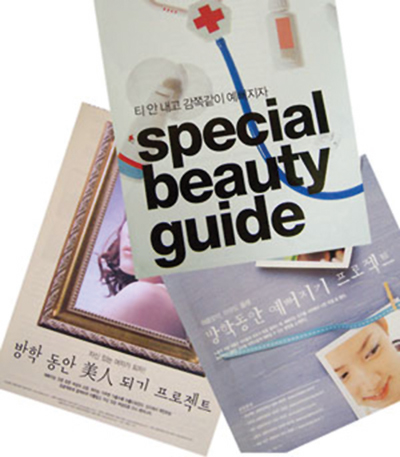
YNO: What made you decide to have a cosmetic surgery operation?
Lee: I'm a senior preparing for employment. Even though appearance isn't a reason to hire anyone for my career line, a pretty face is becoming one of the bonus factors which helps to receive high scores. Faced with this reality, many local students are seeking cosmetic surgery operations. So I decided to do so too. I was not content with my flat nose, so I had an operation performed on my nose.
YNO: After you went under the knife, were you satisfied with yourself and your changed appearance?
Lee: Yes. I think that it is a common wish for females to be beautiful. I'm a woman too, and I had a complex about my flat nose. After I went under the knife, I lost that sense of a complex about it. I gained self-confidence about my appearance and felt motivated about everything. I am satisfied with the operation. I don't regret it so far.
As in this interview, most university students have a complex about their appearance. When someone has a job interview, his or her appearance is of great importance to the interviewer. Even if some achieve high grades, they could fail interviews because of their appearance. For that reason, many college women are running to the cosmetic surgeon. These days, appearance is no less important than ability. Many university students are investing in their appearance. Many university students go under the knife during the long vacation.
This phenomenon, however, is not restricted to university students. Not only high school students but also middle school and even elementary school students are going under the knife. Even if parents object to the operation themselves, some students work at part-time jobs so as to pay for surgery. This obsession has come to be called 'lookism'. What is lookism? Lookism means people believe that one's appearance relates to one's superiority or inferiority. This word 'lookism' was used for the first time by William Safire, a columnist for the New York Times.
What is the cause of lookism? It is a trend in society which assumes a standard of beauty. As many people know, most Miss Korea contestants and fashion models have only 'three sizes'. These three sizes refer to the size of the breast, the waist and the hips thought to be ideal. Although not everyone can have those exact measurements, some people consider these vital statistics as the ultimate objective.
The 'size 44 trend' runs along the same lines. It arose from the idea that only thin bodies are beautiful. Some women, therefore, try to lose weight to fit size 44 clothes.
The greatest influence in the forming of such single-minded ideas on beauty is mass media. That is to say, lookism is expanded and reproduced via the various forms of mass media, TV and newspapers of today which promote awareness of outward appearance.

A majority of people on TV, likely to be considered as having a good appearance, have similar facial features. Most of these people have double eyelids and no wrinkles. It is very hard to find someone with no double eyelids on Korean television. As a result, in Korea, this kind of face is considered the standard for beautiful faces.
Lookism surely has a great effect on our society. Whatever the immense power of lookism is, other social phenomena are also produced. Let's take a close look at these other crazy trends which are the result of lookism.
'Eoljjang syndrome' is a social phenomenon reflecting lookism and it came into fashion due to the internet. Eoljjang is slang and a coined word, meaning a good-looking face. This syndrome developed from the trend of young netizens uploading their own pictures. The pictures spread and were shared between netizens. This syndrome is based on the cyber culture reflecting the common netizen's desire to constantly seek new things. Also, it happens quite often that such eoljjang stars become real stars on TV or in movies.

Another aspect of the lookism frenzy is the trend to seek cosmetic surgery operations. Have you ever heard of gift certificates for cosmetic surgery? They are issued by cosmetic surgeons. If you go to a cosmetic surgeon with that gift certificate, you can get cosmetic surgery on any part of your body up to the amount on the gift certificate. Despite the fact that it contravenes Korean medical regulations, they are sold on the internet. Some people actually give them as presents for college entrance. This gift certificate encourages people to seek and accept cosmetic surgery as something normal.
The First Body Care Beauty Surgery Expo was held over two days from 25 to 26 November in 2006. This expo provoked a lot of controversy, as it was considered an expo merely for the marketing and promotion of cosmetic surgery. This expo was promoted by doctors employed in the cosmetic surgery industry and dermatology clinics. These doctors were consulted about cosmetic surgery and beauty. The very advent of this exhibition suggests how deeply Korea is immersed in the currents of lookism.

Lookism can change the way people look at not only other people's faces but also figures. According to a finding reported in the International Journal of Obesity, 77% of female university students in Korea strive to lose weight. Korea is the most weight-conscious of 22 countries in this regard. In some cases, however, extreme dieters can lose more than just weight; they can lose their lives. Sudden death can be caused by excessive exercises and weight loss over a short period. One example of this fact was Kim Hyeong-gon. A successful comedian, Kim lost nearly 30kg, and soon thereafter his life died at age 46.
Excessive weight-loss can also cause miscarriage. During the years 2003 to 2005, the rate of miscarriage increased 0.3% generally according to the findings of the National Health Insurance Corporation on childbirth, miscarriage and abortion. The rate of miscarriage for women in their twenties has increased steadily from 4.27% in 2003, to 4.31% in 2004, and 4.76% in 2005. It is a sign of a serious problem within society when excessive weight-loss due to lookism even has an effect on childbirth.
Finally, these days, 'Ssaengeol Frenzy' is appearing as another manifestation of lookism. Ssaegeol means to present a face naked, or without make-up.
Some companies and cosmetic surgeons have provided products and services which were designed to help a face without make-up that appears attractive, by means of natural-looking cosmetics, the removal of freckles, and medical skin treatment. Semi-permanent make-up is also in the limelight. In a semi-permanent make-up operation a surgeon injects natural coloring into the skin and makes eye-lines and lip-lines more distinct. This surgical operation came under the spotlight because it is designed to give people confidence to appear in public without wearing make-up, and it doesn't have a potentially bad effect on health. Using this artificial method to obtain an attractive face, however, is not the same thing as natural beauty; the procedure is very expensive.
Why are the symptoms of lookism so prevalent within our society? Is it due to the development of medical technology? Is it the growth of the beauty industry or the mass media emphasizing an artificial standard of beauty? It's difficult to conclude that only one thing is the whole cause. The idea of pursuing someone else's idea of a beautiful appearance develops in people's minds unconsciously.
At the same time, we are losing more and more of our individuality. These days we attach great importance to appearance above all else. We are the subjects who make ourselves victims of lookism. To overcome the situation, we have to pursue our own individuality, our essential beauty and not an artificial beauty, nor external brilliance. This is the way that each person can come to be respected by others for their real, original value.
Accordingly, each member of society should foster a way of thinking focused on ability rather than appearance, and should practice expressing their own special individuality. Moreover, in society, widespread effort should be made to remove the influence of lookism. A public service advertisement, for example, could inform people of the problem of lookism. As education is very important in society, improvements could be made to the education curriculum, with its influence on the young. Through such varied efforts, YNO hopes that individuality will be respected in this society.
Koo Nam-hee / lily1214@yumail.ac.kr
Lee Seol-hee / seolhee1122@yumail.ac.kr


